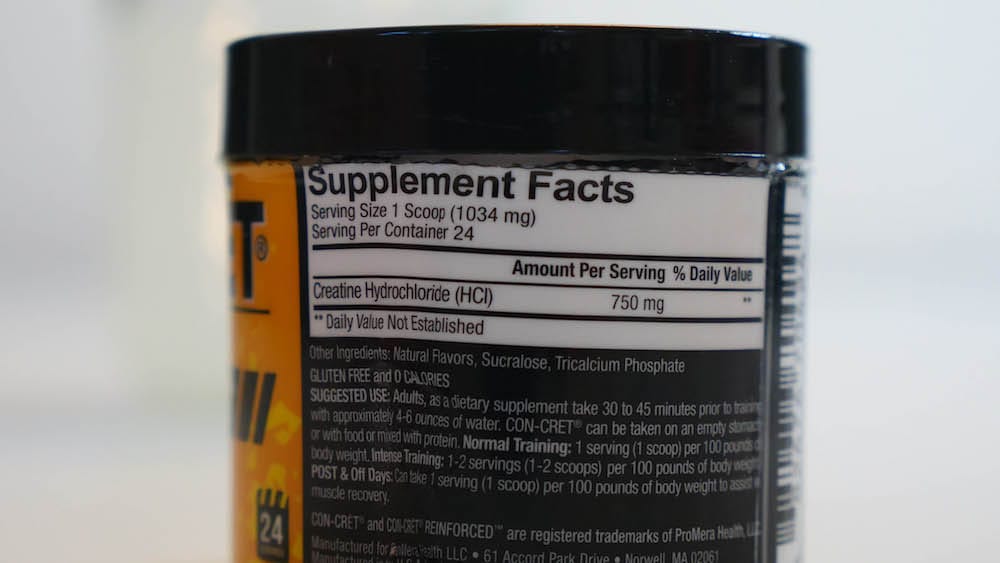Promera Sports is a Massachusetts-based supplement company that has a few products on offer, like pre-workouts and fat burners, but their best-known product is probably CON-CRÈT, their creatine hydrochloride.
The first thing you realize when you see the product is that it’s tiny, just twenty-five grams. Most creatine products suggest a 5-gram serving size, but CON-CRÈT suggests just 750 milligrams per 100 pounds of bodyweight. According to Promera, “Because of its superior solubility, you only need to take small Micro Doses based on your body weight and the intensity level of your workout.”
Let’s take a closer look.
Shop CON-CRÈT Creatine HCl HERE.
CON-CRÈT Creatine HCl Ingredients
One scoop has 750 milligrams of creatine hydrochloride, plus some natural flavors, sucralose, and the anti-caking agent tricalcium phosphate. Note that while this product is free from artificial flavors and colors, it isn’t free from artificial sweeteners: sucralose is also called Splenda®, and some folks try to steer clear of it.

CON-CRÈT Creatine HCl Benefits & Effectiveness
So what is creatine HCl? Is it really more effective? Well, it’s made by attaching creatine to parts of hydrochloride molecules, which lowers its pH. This makes it more soluble in water — so there’s less chance of it pooling in the bottom of your glass — and more importantly, it can reduce digestive distress. Some users experience cramping and other problems when they consume regular creatine, and there’s good evidence that creatine HCl can help remedy the problem for some people. That can be good news.
Then there’s the theory is that because it’s more soluble, creatine HCl absorbs more easily and we need less of it to achieve the same effects as creatine monohydrate. This hasn’t really been tested to conclusiveness. Creatine HCl may break into free creatine and free hydrochloric acid in the stomach, an environment which has lots of hydrochloric acid in it already.

There aren’t many studies that show creatine HCl absorbs better than monohydrate. There is one study that sometimes gets cited to support the theory. First, some caveats: it’s authored by the co-inventor of creatine HCl and it wasn’t published in any journals. (It was presented at the annual meeting of the International Society of Sports Nutrition in 2009).
The experiment showed 70 percent higher creatine in test subjects’ plasma over a couple of hours post-consumption when compared with monohydrate. Some take this to mean that more creatine was used, but this probably isn’t the case: when you consume creatine, it’s mostly send to plasma, sent to muscle, or excreted. More creatine in plasma doesn’t necessarily mean that there’s more of it in the muscle. In fact, the opposite may be true: this may well signify that more creatine went to plasma and less made its way to the muscles, so it’s therefore less effective than creatine monohydrate.
But since this is just one study, we can’t say that’s definitively the case. And that’s the point: there are few studies on creatine HCl and there is not much evidence to say that it’s a more effective way to consume creatine than your standard monohydrate.
CON-CRÈT Creatine HCl Price
You can pick up a small tub of 24 servings for $16.50, which comes to 68.75 cents per scoop or 91.6 cents per gram of creatine. If you want to pay two more dollars, you can get twice the amount: Promera sells 48 servings for $18.50, which comes to 51 cents per gram of creatine.
That’s very expensive compared to creatine monohydrate, which is typically about 3 to 5 cents per gram.
CON-CRÈT Creatine HCl Taste
The Lemon Lime flavor was delicious: it tasted like old-fashioned lemonade, or sweetened lemon.
The Takeaway
If you’re someone who experiences cramps or indigestion when you consume creatine monohydrate, I’d definitely recommend CON-CRÈT, although I can’t say you only need 750mg per 100 pounds bodyweight — the serving size should probably be 5 grams, like it is with creatine monohydrate.
But if you’re interested in the product just because it’s meant to be a more effective form of creatine, I would suggest you take a look at the scientific evidence before paying the price for CON-CRÈT.
